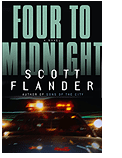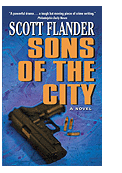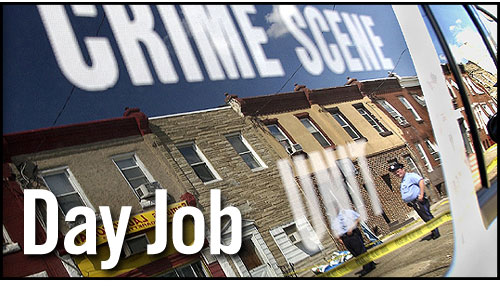  
|
|
 REAL TALES OF CRIME SCENE INVESTIGATORS
Get a clueThey handle crime scenes Crime scene cops specialize in getting physical evidence IF YOU WATCH cop shows on TV, then you know how to handle a murder scene, right? You walk around the house looking for clues—opening drawers, picking up books and magazines, even checking inside the refrigerator. It's OK to smoke, just make sure you stub out the cigarette in the ashtray with the other butts. And if you want to turn the body over to get a good look at the face, that's OK, too. When Philly Police Officers Jim Bushman and Jim Caldwell see stuff like that, it makes them crazy. Those TV cops, Bushman and Caldwell are thinking, probably just destroyed a boatload of good evidence. And what makes it all the worse is that they've seen real cops do things like that at real murder scenes. Bushman and Caldwell are members of the Crime Scene Unit. And one of their jobs is to teach other cops how to process crime scenes. At special three-day classes at the Police Academy, they show detectives and street cops how to dust for fingerprints and collect other evidence. But first they emphasize: Don't mess up the scene in the first place. Like the cigarettes—these days, the saliva left by smokers can be checked for DNA. So, you really don't want to do anything to that ashtray, or leave your own DNA sitting around. Try explaining that in court. (It's almost as embarrassing as writing in your report that you found "seminole" fluid at a crime scene—a not uncommon spelling error.) All big-city police departments have crime scene units like the one here. But Philly is the only one in the country that teaches its trade to cops throughout the department, according to Lt. Mark Fisher, who commands the unit. Philadelphia's 22-member unit can't handle every crime scene—in fact, it can respond to only a small percentage, primarily homicides and shootings involving police. Which means that at many other types of crimes, such as home burglaries - no evidence is collected at all. That can be frustrating, particularly if your house was the one that was burglarized. To help solve the problem, the crime scene class teaches not only detectives but regular street cops how to search for and collect basic evidence. "It's not rocket science, but it is science," said Fisher. After taking over the unit in early 1998, Fisher said, he saw a real need for crime-scene training throughout the department and proposed the idea to Police Commissioner John Timoney and Inspector Michael Cooney. Both were supportive. "They gave me the power to do it," said Fisher. So far, more than 700 cops have gone through the Bushman-Caldwell class at the academy. "If you're a recent victim of a crime," said Bushman, "the chances are 700 times better than they were a year ago that the crime will be solved." The 30 or so officers at the most recent class learned things like: Splattered blood can travel no more than 46 inches from a wound. The drops are too heavy to go any farther. If the splatter is from a knife wound, you can often tell whether the stabber was left- or right-handed. People lose an average of 200 hairs a day. Which means that hair can be found at virtually every crime scene. And a single hair can reveal a great deal of information, such as a person's race, gender, drug use—even if they have a vitamin deficiency. "There's more in that follicle," Bushman told the class, "than in someone's driver's license and birth certificate combined." You can't shoot someone and then put the gun in his hand to make it look like a suicide. That's because once a person is dead, you can't wrap his hand around the gun—the muscles won't contract. You can actually use Superglue fumes to get fingerprints. Contrary to popular belief, tests to determine whether someone has fired a gun work only about half the time. While detectives and other cops rely on eyewitnesses—who are often unreliable—the crime-scene guys deal strictly with physical evidence - nice, clean facts. "The way human beings interpret the evidence clouds the water," said Bushman. "Physical evidence is better than any eyewitness you'll ever have. It doesn't lie." In their classes, Bushman and Caldwell teach cops how to collect evidence, though not process it. That will be done at the Crime Scene Unit's offices at Police Headquarters. Uniformed officers who take the class will handle only crimes against property, like burglaries and car thefts, said Fisher. They'll dust for fingerprints, take photographs, and collect things like pieces of broken glass—which, for example, could match glass found on a suspect's clothes. Detectives will be able to handle more serious cases, collecting evidence such as dried blood—which can be scraped into envelopes—and hair—which can be picked up off the floor with tape. As those who took the recent class learned, it's suprisingly easy to dust for fingerprints. You simply sprinkle some special powder on the surface you're looking at - like a window or a soda bottle—and then brush off the excess with the kind of fluffy brush you always see detectives using in the movies. What appears are black fingerprints. You then take a roll of wide, clear tape, and press the sticky side to the fingerprints. It lifts the print off, the way Silly Putty lifts off printing from newspapers. Finally, you stick the tape with the fingerprints on a white index card, which you label and then send to the lab. Bushman said that graduates of the class are already solving crimes. One detective recently cracked a home invasion case in South Philadelphia by retrieving a manila envelope from the floor that had the dust imprint of a sneaker. The imprint matched the suspect's sneaker—and when confronted with that evidence, the suspect promptly confessed. Those who took the recent class said they were looking forward to using their new knowledge. "If I can process a scene that someone else can't process, then there's less chance of a criminal getting away," said Sgt. David Hunter, of the 18th District, in West Philadelphia. Bushman, who has spent most of his 30-year-career in the Crime Scene Unit and will retire soon, says physical evidence is there for the taking, if cops know where and how to look. "It sits undetected," he says. "It waits to tell a story." Read the next story, HEY, PAL, PULL OVER!. Home | Books | About Scott | Links |